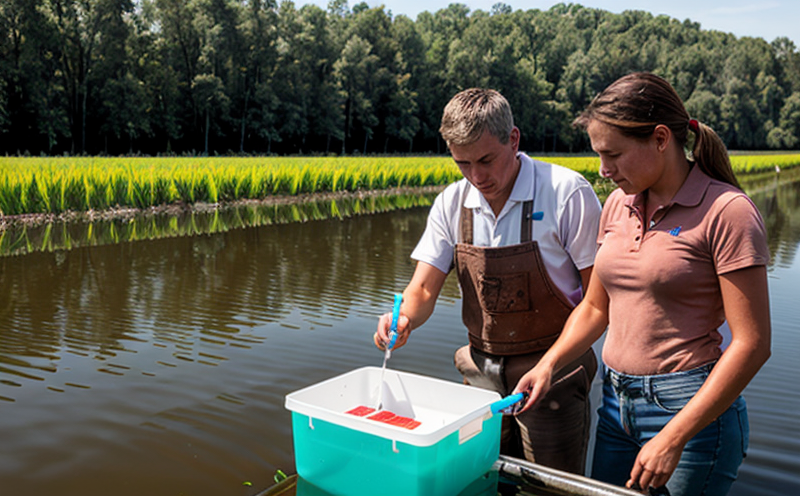Calcium Content Testing in Agricultural Water
The importance of calcium content testing in agricultural water cannot be overstated. Calcium plays a crucial role in plant growth and development, influencing the health and productivity of crops. In this context, accurate and reliable testing is essential for maintaining optimal soil pH levels, enhancing nutrient uptake, and ensuring sustainable farming practices.
Water quality significantly affects the effectiveness of agricultural inputs such as fertilizers and pesticides. Calcium, being a key component in the structure of cell walls and membranes, aids in the transport of nutrients through plants. Therefore, understanding the calcium content in irrigation water is paramount for optimizing crop yield and minimizing environmental impact.
The testing process involves several steps, starting with sample collection from various sources such as wells, rivers, or reservoirs. Proper sample handling ensures accurate results by preventing contamination. Laboratory analysis typically uses atomic absorption spectrophotometry (AAS) or inductively coupled plasma mass spectrometry (ICP-MS), both of which are sensitive and precise methods for determining calcium concentrations.
Compliance with international standards like ISO 7404:1983 is crucial to ensure consistency and reliability. This standard specifies the method for the determination of total dissolved solids, including calcium, in water. Adherence to these guidelines ensures that testing results are comparable across different laboratories.
Accurate testing also supports sustainability efforts by identifying potential sources of contamination. Elevated levels of calcium can indicate excessive use of limestone or other calcium-rich amendments, which might lead to over-fertilization and subsequent environmental harm. By monitoring calcium content, farmers can make informed decisions about their irrigation practices, reducing unnecessary inputs and minimizing runoff into nearby water bodies.
In addition to its role in plant nutrition, calcium contributes to soil structure stability. Excessive levels of calcium in irrigation water can lead to increased soil pH, which may hinder the uptake of other essential nutrients like phosphorus and potassium. Therefore, precise testing is necessary to balance these factors effectively.
Scope and Methodology
The scope of calcium content testing in agricultural water encompasses a wide range of applications aimed at ensuring optimal crop health and environmental sustainability. This service focuses on the determination of total dissolved calcium present in irrigation, drinking, and groundwater sources used for agriculture.
To perform this test accurately, we follow strict protocols that include sample preparation, calibration of instruments, and adherence to recognized standards such as ISO 7404:1983. The process begins with the collection of representative samples from various locations within a farm or irrigation system. These samples are then transported to our laboratory for analysis.
| Step | Description |
|---|---|
| Sampling | Collect water samples from different points of the irrigation system. |
| Storage | Store samples in appropriate containers to prevent contamination and degradation. |
| Calibration | Ensure that all analytical instruments are calibrated using certified reference materials (CRMs). |
Once prepared, the samples undergo rigorous analysis using state-of-the-art equipment. This includes atomic absorption spectrophotometry for quantitative measurement and inductively coupled plasma mass spectrometry for trace element detection. The results are reported according to internationally recognized standards, providing clients with reliable data that can inform their decision-making processes.
Environmental and Sustainability Contributions
The accurate determination of calcium content in agricultural water contributes significantly to environmental protection and sustainability. By ensuring proper levels of this essential nutrient, farmers can reduce the risk of over-fertilization, which leads to pollution of surface waters and groundwater.
In addition to its role in plant health, maintaining appropriate calcium concentrations helps preserve soil fertility by supporting beneficial microbial activity. Excessive or insufficient calcium can disrupt these natural processes, leading to reduced crop yields and increased susceptibility to pests and diseases.
Our testing services play a vital role in promoting sustainable agricultural practices by providing farmers with actionable insights based on real-world data. This information allows them to adjust their irrigation methods and fertilizer applications more efficiently, thereby reducing waste and minimizing environmental impact.
The data collected through our calcium content tests also supports broader initiatives aimed at improving water quality both within the farm boundaries and beyond. By identifying areas where adjustments are needed, we contribute to creating healthier ecosystems that benefit all stakeholders involved in agriculture.
Use Cases and Application Examples
| Application | Description |
|---|---|
| Irrigation Water Management | Determine optimal water usage by monitoring calcium content to avoid over-fertilization. |
| Sustainable Farming Practices | Support balanced soil pH levels and enhance nutrient availability for crops. |
| Eco-friendly Fertilizer Use | Avoid unnecessary applications of calcium-rich amendments, thus reducing environmental burden. |
| Water Quality Monitoring | Ensure compliance with regulatory requirements for safe drinking water and irrigation. |
| Crop Nutrient Management | Optimize nutrient uptake by balancing calcium levels in the soil and irrigation water. |
| Pollution Prevention | Identify sources of contamination early on to prevent further degradation of natural resources. |





